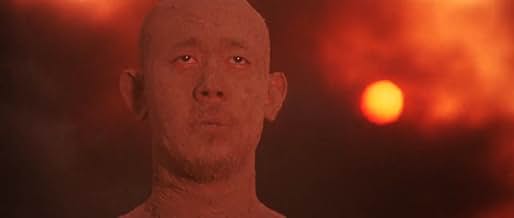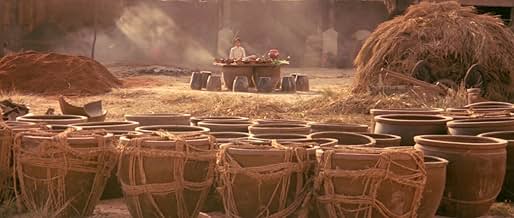IMDb RATING
7.3/10
10K
YOUR RATING
When a leprous winery owner in 1930s China dies a few days after his arranged marriage, his young widow is forced to run the winery to make a living while contending with bandits, her drunka... Read allWhen a leprous winery owner in 1930s China dies a few days after his arranged marriage, his young widow is forced to run the winery to make a living while contending with bandits, her drunkard lover, and the invading Japanese army.When a leprous winery owner in 1930s China dies a few days after his arranged marriage, his young widow is forced to run the winery to make a living while contending with bandits, her drunkard lover, and the invading Japanese army.
- Awards
- 17 wins & 7 nominations total
Rujun Teng
- Wo Luohan Yeye (Uncle Luohan)
- (as Rujun Ten)
- Director
- Writers
- All cast & crew
- Production, box office & more at IMDbPro
Featured reviews
The much heralded renaissance of New Chinese Cinema can be an acquired taste to many Western filmgoers, but this handsome period piece (directed by the cinematographer of 'Yellow Earth', 1984) is livelier and more accessible than most. Part folk tale, part historical drama, it tells the story of a young virgin (sold by her father into marriage with a wealthy leper, in return for a mule), who after her husband's mysterious death continues to run his successful vineyard, with help from her loyal wedding bearers. And yet for all its undeniable physical beauty and colorful action the film can be a dry experience, at least until the outbreak of the second Sino-Japanese War in the 1930s. With the Japanese occupation some emotional urgency finally breaks through the film's mantle of reserve, which up to that point had marked even the more bawdy episodes of communal singing and drinking.
Here is a solid film by Yimou Zhang, from the fifth generation of Chinese directors. Red Sorghum is told as a flashback, a narration by the main character's grandson. Gong Li plays an attractive lower-class Chinese woman who is sent, against her will, to be married to an old leper who runs a winery.
The story takes place on the eve of the Japanese occupation before World War II and later features some ugly scenes from their invasion. There is an underlying motif regarding feminism (a lot of this generation of Chinese directors seemed to deal with this) and the inability of females to be even remotely empowered in this time and place. I enjoyed seeing the class boundaries and customs of late-Qing China, the occasionally goofy sense of humor, and the almost lawless, ruthless communities out in the desert.
The film takes place in only a handful of locations, but features some gorgeous cinematography. The vibrant red colors (perhaps an allusion to Communist rule and foreshadowing bloodshed? It's hard to tell whether this film is for or against Communist China) are illustrated vividly by the sorghum wine and the long views of the sun setting across the Chinese desert. The pacing is slow but efficient and the story is a memorable one.
It's quite indisputable (to me, at least!) that, although this was Yimou Zhang's first film, it's loads better than his later movies, "Hero" and "House of Flying Daggers". Hopefully one day he'll catch up to where he started.
The story takes place on the eve of the Japanese occupation before World War II and later features some ugly scenes from their invasion. There is an underlying motif regarding feminism (a lot of this generation of Chinese directors seemed to deal with this) and the inability of females to be even remotely empowered in this time and place. I enjoyed seeing the class boundaries and customs of late-Qing China, the occasionally goofy sense of humor, and the almost lawless, ruthless communities out in the desert.
The film takes place in only a handful of locations, but features some gorgeous cinematography. The vibrant red colors (perhaps an allusion to Communist rule and foreshadowing bloodshed? It's hard to tell whether this film is for or against Communist China) are illustrated vividly by the sorghum wine and the long views of the sun setting across the Chinese desert. The pacing is slow but efficient and the story is a memorable one.
It's quite indisputable (to me, at least!) that, although this was Yimou Zhang's first film, it's loads better than his later movies, "Hero" and "House of Flying Daggers". Hopefully one day he'll catch up to where he started.
This film captures the Chinese landscape with a touch of love, love that the filmmakers had for their people and their culture which fuses with the sorghum fields and the folk songs they sing when they are happy or when they are in pain and anguish, beautifully. I felt the Japanese effect or the tyrannical force with which they subdued the Chinese should have been shown a little more, it all happened in a jiffy. The storytelling is pretty but fails to connect on many levels. Like the transition of a poor village girl into a strong distillery owner and the level of trust and love she is shown by the workers and the sudden infatuation that develops and is accepted between her and Yu. Also the way we are shown the attack sequence was not at all engaging, it only had slow-mo shots of people falling/running but the final shot of redness surrounding Yu and his son was brilliant. Watch it, for you'll get a peek into Chinese culture, the position of women in it, their traditions and songs and most importantly the red wine, red like blood mingling to mark a jarringly tough Chinese wartime life.
There are several versions of this film available on video. Some are in wide screen, some aren't. The impact of the visuals is lost without the full-shot wide screen. Then there are two different subtitled versions, one that has large subtitles and another that uses smaller but less intrusive subtitles, which is the best of the two. So depending on what version of the video you're watching, your experience of the film can vary. But assuming you get your hands on the good version...
This film is like a quiet fairy tale that transforms into something that I didn't see coming. The visuals are stunning. The story slowly unfolds but is presented so well that it's completely compelling. The acting is as good as it gets. And the ending hits you like a punch in the stomach.
This films stands out from all other Chinese films I have seen. It has a character uniquely its own, and is well worth seeking out.
This film is like a quiet fairy tale that transforms into something that I didn't see coming. The visuals are stunning. The story slowly unfolds but is presented so well that it's completely compelling. The acting is as good as it gets. And the ending hits you like a punch in the stomach.
This films stands out from all other Chinese films I have seen. It has a character uniquely its own, and is well worth seeking out.
Credit goes to Yimou for stripping this epic 2 novel series down to this spare and gorgeous little hour and a half. For all the recent fantastic forays into Chinese fantasy, this story (which is allegedly true) shown as it is, is as close to a fairy tale as it gets, at least until the very end. Every shot is a painting. For some reason this film is still near-impossible to find on DVD. I truly hope it is not being suppressed for anti-Japanese sentiment expressed in it. That would be a terrible shame. This film was released shortly before Tienanmenn (sp) and it has a boldness and frank humor rarely seen in Chinese film since.
Did you know
- TriviaThe films screenplay was based on the novel of the same name by Chinese author Mo Yan. In 2012, Mo Yan was awarded the Nobel Prize in Literature. The Swedish Academy awarded him the prize as an author "who with hallucinatory realism merges folk tales, history and the contemporary".
- ConnectionsFeatured in The Turandot Project (2000)
- How long is Red Sorghum?Powered by Alexa
Details
Box office
- Gross worldwide
- $108,371
- Runtime
- 1h 31m(91 min)
- Sound mix
- Aspect ratio
- 2.35 : 1
Contribute to this page
Suggest an edit or add missing content

























